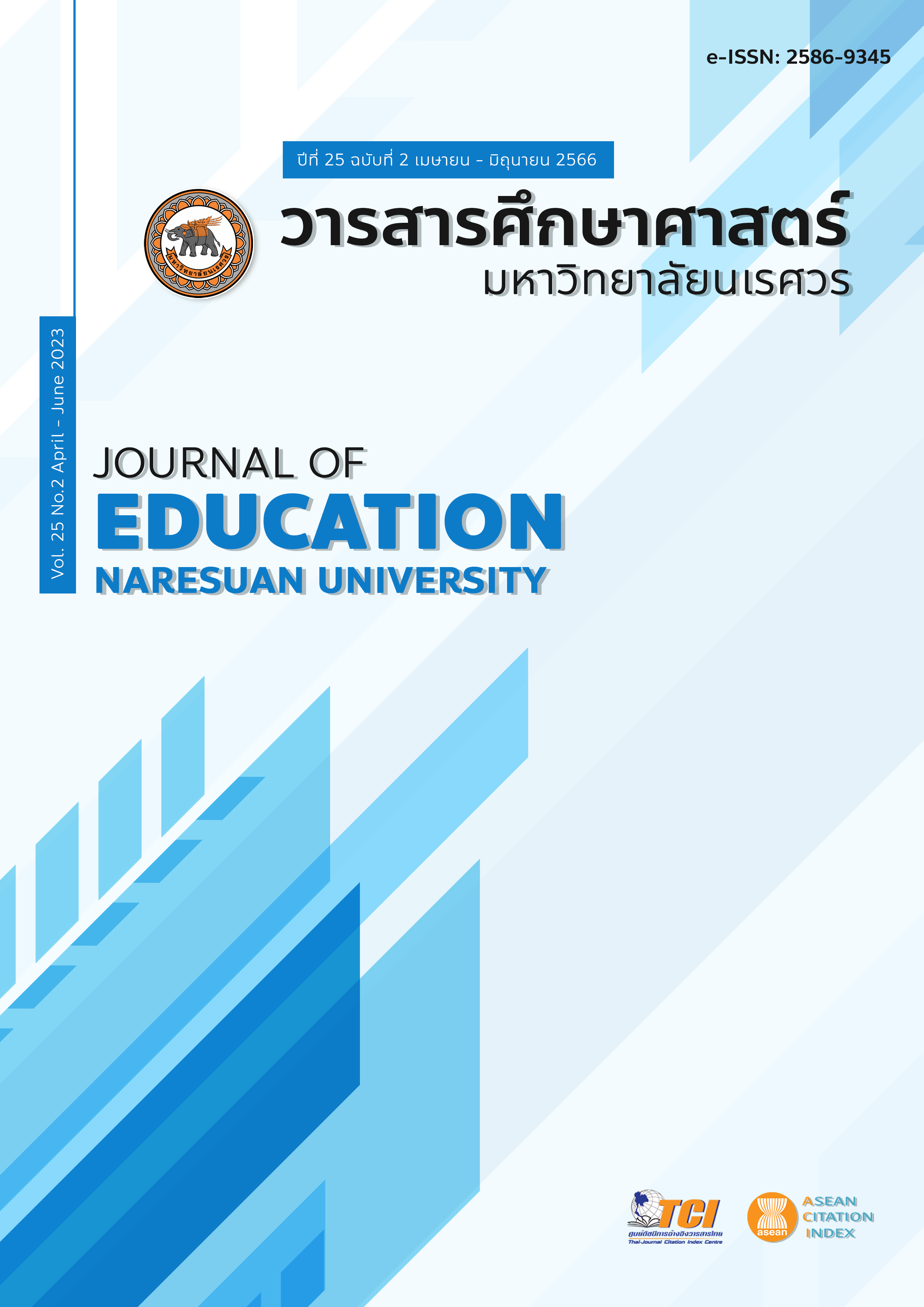EFFECTS OF DESIGNING PERSONAL LEARNING ENVIRONMENT WITH VIRTUAL AGENT ON ENGLISH CRITICAL READING ABILITY AND READING ENGAGEMENT OF SECONDARY SCHOOL STUDENTS ผลการออกแบบสภาพแวดล้อมการเรียนรู้ส่วนบุคคลร่วมกับผู้ช่วยเสมือนที่มีต่อความสามารถทางการอ่านภาษาอังกฤษอย่างมีวิจารณญาณ และความยึดมั่นผูกพันในการอ่าน ของนักเรียนชั้นมัธยมศึกษา
Main Article Content
Abstract
The purposes of this research were: 1) to study the results of students’ English critical reading ability and reading engagement after studying in Personal Learning Environment with Virtual Agent, 2) to compare English critical reading ability and reading engagement between control group and experimental group, and 3) to analyze the Canonical Correlation between English critical reading ability and reading engagement. The samples were 70 students of two classes of grade 9 in Mathayom Wat Nong Khaem School divided into 2 groups: 35 students in a control group, and 35 students in an experimental group obtained by two-stage random sampling. The research instruments were learning designs, English critical reading test, and self-assessment form. The data were analyzed by using descriptive statistics, Dependent and Independent t-test, and Canonical Correlation analysis. The results of the research revealed that: 1) after the experiment, the experimental group had an average score of English critical reading ability and reading engagement higher than before the experiment at .05 level of significance, 2) after the experiment, the experimental group had an average score of English critical reading ability higher than the control group but the reading engagement scores between two group were not different, and 3) English critical reading ability correlated with reading engagement at the statistical significance of .05.
Article Details

This work is licensed under a Creative Commons Attribution-NonCommercial-NoDerivatives 4.0 International License.
The owner of the article does not copy or violate any of its copyright. If any copyright infringement occurs or prosecution, in any case, the Editorial Board is not involved in all the rights to the owner of the article to be performed.
References
Aghajani, M., & Gholamrezapour, E. (2019). Critical thinking skills, critical reading and foreign language reading anxiety in Iran context. International Journal of Instruction, 12(4), 219-238. doi:10.29333/iji.2019.12414a
Ahmad, S. Z. (2019). Impact of Cornell notes vs. REAP on EFL secondary school students’ critical reading skills. International Education Studies, 12(10), 60-74. https://doi.org/10.5539/ies.v12n10p60
Amalia, F., Inderawati, R., & Erlina, E. (2018). Reading comprehension achievement on narrative text by using REAP strategy. Channing: English Language Education and Literature, 3(1), 1-7.
Chen, H., Widarso, G. V., & Sutrisno, H. (2020). A chatbot for learning Chinese: Learning achievement and technology acceptance. Journal of Educational Computing Research, 58(6), 1161-1189. https://doi.org/10.1177/0735633120929622
Fryer, L. K., & Carpenter, R. (2006). Emerging technologies bots as language learning tools. Language Learning & Technology, 10(3), 8-14.
Fryer, L. K., Nakao, K., & Thompson, A. (2019). Chatbot learning partners: Connecting learning experiences, interest and competence. Computers in Human Behavior, 93, 279-289. https: //doi.org/10.1016/j.chb.2018.12.023
Keereerat, C., Na-Songkhla, J., & Sujiva, S. (2019). A study of creating personal learning environments by students of the Faculty of Education Majoring in Computer Education. Journal of Education Studies, Chulalongkorn University, 47(4), 176-196.
Kien, L., & Huan, N. (2017). Teacher beliefs about critical reading strategies in English as a foreign language classes in Mekong Delta Institutions, Vietnam. European Journal of English Language Teaching, 2(4), 39-57. doi:10.5281/zenodo.816208
Kim, N., Cha, Y., & Kim, H. (2019). Future English learning: Chatbots and artificial intelligence. Multimedia-Assisted Language Learning, 22(3), 32-53.
Khamya, N., & Sunthornrote, W. (2018). Thai learning by group discussions with BBL activity to promote critical reading problems solving and self-confidence of mattayomsueksa 2 students. Journal of Educational Measurement Mahasarakham University, 23(1), 92-102. [in Thai]
Khongphanao, S., & Chitthaisong, T. (2018). The development of critical reading ability in English in mattayomsuksa 3 students based on stringer’s action research. Journal of Research and Development, Buriram Rajabhat University, 13(2), 119-133. [in Thai]
Office of the Education Council. (2017). National Education Act of B.E. 2560-2579 (2017-2036). Bangkok: Prikwarn Graphic. [in Thai]
Pakdeewong, U., Sinlarat, P., & Fakkhao, S. (2019). The development of an English reading and writing abilities of undergraduate students. Journal of Graduate Studies Valaya Alongkorn Rajabhat University, 13(3), 179-191. [in Thai]
Protacio, M. S. (2017). A case study exploring the reading engagement of middle grades English learners. RMLE Online, 40(3), 1-17. https://doi.org/10.1080/19404476.2017.1280586
Saks, K., & Leijen, A. (2014). Developing language learning strategies in a personal learning environment: Pilot study. Advances in Web-Based Learning – ICWL 2014 Lecture Notes in Computer Science, 66-76.
Song, D., Rice, M., & Oh, E. Y. (2019). Participation in online courses and interaction with a virtual agent. The International Review of Research in Open and Distributed Learning, 20(1), 43-62. https://doi.org/10.19173/irrodl.v20i1.3998
Tangkittipon, P., Sawatdirat, A., Lakkhanawannakun, P., & Noyunsan, C. (2020). Facilitating a flipped classroom using chatbot: A conceptual mode. Mahasarakham International Journal of Engineering Technology, 6(2), 103-107.
The Institute for the Promotion of Teaching Science and Technology. (2018). PISA 2018 Assessment Results. Bangkok: The Institute for the Promotion of Teaching Science and Technology. [in Thai]
Varaporn, S., & Sitthikul, P. (2019). Effects of multimodal tasks on students' critical reading ability and perceptions. Reading in a Foreign Language, 31(1), 81-108.
Xu, X., Chan, F. M., & Yilin, S. (2018). Personal learning environment: An experience with ESP teacher training. Interactive Learning Environments, 28(6), 779-794. doi:10.1080/10494820.2018.1552872
Utami, R., Amalia, N., Prayitno, H., & Ain, D. (2020). Critical reading skills through multimodal text to upper-class students in elementary school. International Journal of Innovation, Creativity and Change, 11(5), 779-794.
Ya’acob, A., Latiff, R., Rashid, T., Othman, S., & Mushahar, R. (2020). R.E.A.P strategy: Developing Esl learners as critical readers. International Journal of Scientific and Technology Research, 9(13), 1227-1233.
Yimwilai, S. (2019). Increasing EFL students’ English reading ability and engagement through multimodal learning environments. Humanities and Social Sciences Journal of Graduate School, Pibulsongkram Rajabhat University, 13(2), 368-382.
Yulia, M., Sulistyo, G., & Cahyono, B. (2020). Affective engagement in academic reading: What EFL student teacher reveal. International Journal of Evaluation and Research in Education, 9(3), 791-798. Doi:10.11591/ijere.v9i3.20635


